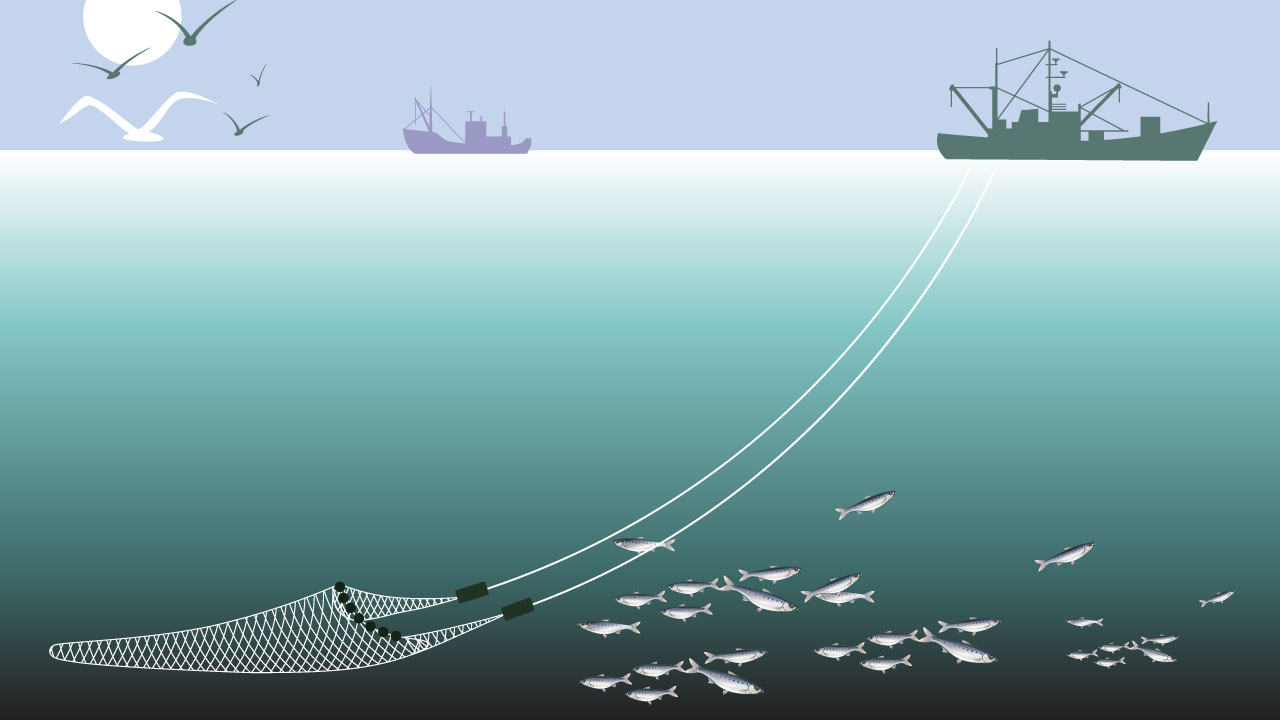Ireland currently has the opportunity to enact a previously overturned fisheries policy which was one of the most important conservation measures for marine ecosystems and local fishing communities in the state’s history, and SWAN calls on the public to voice their support.
The Department of Agriculture, Food & the Marine (DAFM) has opened a public consultation on “Trawling Activity Inside the Six Nautical Mile Zone and the Baselines,” with a deadline for responses of 12 April 2024. It is vital for Ireland’s marine ecosystems for the Department to see a groundswell of support from the public, along with conservation organisations and inshore fishers, for the proposed ban on larger vessels.
A ban on trawling by vessels over 18 metres within the six nautical mile (6nm) zone was first announced in December 2018, with support from both environmental NGOs and much of the inshore fishing sector, with Irish Wildlife Trust deeming it “the most positive thing that ever happened for conservation in the ocean.” Over 900 responses were received in the 2018 consultation, with the majority supporting restrictions. The directive came into force in January 2020 but was unfortunately overturned in October 2020 on a technicality. Apart from a temporary stay on the overturning of the ban in 2021, fishing has continued unabated in inshore waters by large trawlers, harming both ecosystems and livelihoods. A joint letter sent to the responsible Minister in 2020 from SWAN, a number of other environmental groups, the National Inshore Fishermen’s Association and the National Inshore Fishermen’s Organisation called for a reinstatement of the ban, which was “broadly welcomed as being the right decision from a social, economic, environmental and social justice perspective.”
Now, DAFM has launched a new consultation process to review trawling activity in inshore waters. With over four years passed since the ban’s first introduction, we must now act swiftly and decisively to ensure the return of a policy which will help protect Ireland’s biodiversity, marine ecosystems and small-scale fishers. Reports on the Department’s consultation website from the Marine Institute and Bord Iascaigh Mhara (the state agency for the Irish seafood sector) provide evidence for the possible impacts and outcomes of proposed regulations, such as:
- Improved management of inshore waters
- Improving availability of fish in inshore waters
- Protection of fish recruitment and stock components
- Improved economic opportunity for smaller sea-fishing boats
- Re-establishing links between local fish resources, local fleets and local economies
The Marine Institute reports that the “6nm zone around Ireland consists of diverse habitats and include large areas of reef, coarse sediments, sands, and muds, each supporting different fish species and assemblages of marine organisms.” As such, it is vital these habitats are protected from the heaviest fishing pressures. This ban will not affect the majority of Irish fishers, which are primarily vessels under 10m in length. However, the Institute found that “the majority of the landings tonnage is taken by vessels of 18m and over (88%).” By restricting inshore areas to smaller vessels, there will be greater stock availability for small-scale fishers, and allow vulnerable ecosystems to recover.
This is a necessary conservation policy not least for sprat, a non-quota species which has been fished beyond scientific advice for years in Ireland, almost exclusively within the 6nm zone. This forage fish is a vital part of the marine food web, forming a major part of the diet of iconic species found in Irish waters, such as humpback whales and puffins. When fished by large trawlers, sprat is generally sold for fishmeal, rather than human consumption. The issue of large trawlers operating near the coast, within such sensitive and important areas as Bantry Bay, was raised in the Dáil in 2021 as “a very important issue for many fishers, the marine sector and coastal ecosystems”, so with three years of unrestricted extraction since then, it is vital the ban is implemented immediately.
SWAN and other Irish environmental groups are encouraged that many inshore fishers support the same option. A joined-up approach from the conservation and fishing sectors in calling for a ban on trawling by vessels over 18m is a strong stance to present to DAFM and our best opportunity to reimplement this important policy.
SWAN encourages all interested parties to submit a response to DAFM. You can complete the full online survey, or send an email or letter saying you join Ireland’s environmental NGOs in calling for:
- All sea-fishing boats over 18m in length overall excluded from trawling inside the six nautical mile zone and baselines
- Implementation at national level
- Implementation put into full effect once a decision is made
Deadline: 13:00 on 12/04/2024
Online survey : https://ec.europa.eu/eusurvey/runner/TrawlingConsultation
or Email: TrawlingConsultation@agriculture.gov.ie
(Quoting “Inside 6 Trawling Consultation” addressed to the Minister for Agriculture, Food and the Marine). Edit, sign, and send a pre-made email submission by clicking here.
or Post: Public Consultation on Trawling Activity Inside 6nm, Sea Fisheries Policy and Management Division, Department of Agriculture, Food and the Marine, National Seafood Centre, Clonakilty, Co. Cork, P85 TX47

